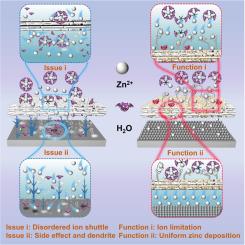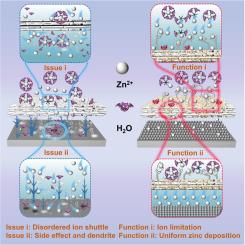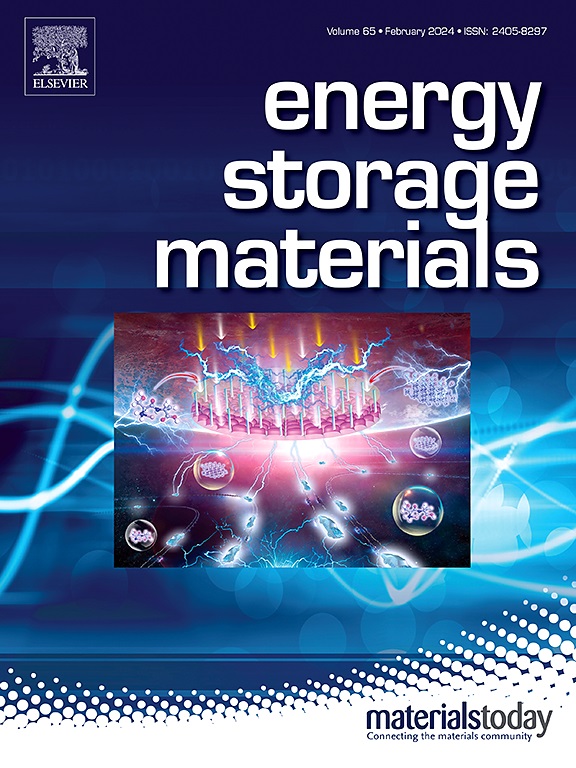通过带有特殊官能团的微孔金属有机框架实现分离器官能化,从而获得稳定的锌阳极
IF 20.2
1区 材料科学
Q1 CHEMISTRY, PHYSICAL
引用次数: 0
摘要
锌离子水电池(AZIBs)因其安全性、高比容量和丰富的锌资源等优点,一直被视为最有前途的储能系统之一。尽管 AZIBs 前景广阔,但其实际应用仍受到锌表面枝晶和副反应的困扰。本文通过原位负载金属有机框架 MIL-125 (M-125)及其 -NH2 功能化材料(NM-125)对玻璃纤维分离器进行了改性。成功地调整了设计的分离器孔隙结构,并赋予其 -NH2 官能团,最终显著提高了 AZIBs 在实际操作条件下的电化学性能。功能化后的 NM-125 孔径和粒径更小,因此 NM-125-GF 能够阻止电解液中大分子阴离子的迁移,引导和促进锌离子有序迁移。此外,NM-125 的 -NH2 还能吸附 Zn2+,并将其从溶解结构中分离出来,从而抑制阳极侧反应的产生,优化电池性能。值得注意的是,使用 -NH2 功能化隔膜组装的 Zn||MnO2 全电池也显示出较高的初始放电比容量(160.2 mAh g-1),即使在 700 次循环后,容量保持率也高达 ∼ 99.8%。功能化隔膜的合理设计为优化高性能 AZIB 提供了有用的指导。本文章由计算机程序翻译,如有差异,请以英文原文为准。


Separator functionalization realizing stable zinc anode through microporous metal-organic framework with special functional group
Aqueous zinc ion batteries (AZIBs) have been regarded as one of the most promising energy storage systems because of their security, high specific capacity and abundant zinc resources, etc. Despite the promising prospects of AZIBs, their practical application is still plagued by dendrite and side reactions on zinc surface. In this paper, glass fiber separators were modified by in-situ loading metal-organic framework MIL-125 (M-125) and its -NH2-functionalized material (NM-125). The designed separator pore structure was successfully adjusted and endowed with -NH2 functional groups, which can ultimately dramatically enhance the electrochemical performance of AZIBs under practical operation conditions. The functionalized NM-125 with smaller pore size and particle size enables NM-125-GF to prevent the transport of macromolecular anions in the electrolyte, guiding and promoting zinc ions to undergo an orderly migration. In addition, -NH2 of NM-125 can adsorb Zn2+ and detach them from the solvated structure, inhibiting the generation of anode-side reactions and optimizing battery performance. Notably, Zn||MnO2 full cell assembled with -NH2 functionalized separator also shows a high initial discharge specific capacity (160.2 mAh g-1) with a high capacity retention of ∼99.8% even after 700 cycles. The rational design of the functionalized separator provides a useful guideline for optimizing high-performance AZIBs.
求助全文
通过发布文献求助,成功后即可免费获取论文全文。
去求助
来源期刊

Energy Storage Materials
Materials Science-General Materials Science
CiteScore
33.00
自引率
5.90%
发文量
652
审稿时长
27 days
期刊介绍:
Energy Storage Materials is a global interdisciplinary journal dedicated to sharing scientific and technological advancements in materials and devices for advanced energy storage and related energy conversion, such as in metal-O2 batteries. The journal features comprehensive research articles, including full papers and short communications, as well as authoritative feature articles and reviews by leading experts in the field.
Energy Storage Materials covers a wide range of topics, including the synthesis, fabrication, structure, properties, performance, and technological applications of energy storage materials. Additionally, the journal explores strategies, policies, and developments in the field of energy storage materials and devices for sustainable energy.
Published papers are selected based on their scientific and technological significance, their ability to provide valuable new knowledge, and their relevance to the international research community.
 求助内容:
求助内容: 应助结果提醒方式:
应助结果提醒方式:


